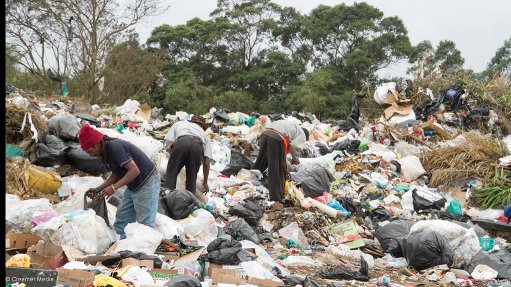
GROWING SECTOR
The waste picker sector is growing and plays a key role in South Africa’s recycling strategy
Photo by: Creamer Media
The circular economy, as a reformative system, presents significant opportunities for Africa to deliver on more inclusive economic growth, which includes job opportunities and the positive environmental practices that are in dire need for sustainable growth, says waste management company Interwaste business development and marketing director Kate Stubbs.
The ideology of the circular economy is that the linear model of make, use and dispose must be abandoned, and that a more sustainable ecocycle can be achieved through the long-term design and planning of products, maintenance, repair, reuse, remanufacturing, refurbishing, recycling and upcycling, she tells Engineering News.
Although the adoption of the circular economy is still in its infancy in South Africa, she points out, there are success stories, where, through innovation, new business streams and even new industries – such as the waste picker sector, reprocessing and waste-to-energy industries – are being introduced.
“For example, while recycling offers many environmental benefits, its ability to create jobs cannot be emphasised enough. In fact, the waste picker sector is growing and plays a key role in South Africa’s recycling strategy.”
Stubbs notes that waste pickers are reported to earn between about R290 and R770 a week from the waste they collect, demonstrating the potential of waste to create an income stream for individuals.
Further, as recycling becomes more of a national priority, it presents more opportunities for waste pickers to work individually to support their families or potentially to organise themselves into small businesses. She highlights that, with the correct resources, waste pickers can employ other members of their communities, thereby creating employment opportunities through the informal sector.
Moreover, the drive to divert waste from landfill has directly resulted in waste disposers and/or waste management companies merging into reprocessing industries, with significant focus being placed on reuse, recycle and repurpose. “This is leading to manufacturers of products and packaging, as well as resellers, rethinking the way their products and processes are designed.”
Stubbs cites the commitment by local retailers in South Africa to move away from non-degradable and plastic packaging as a recent example of this.
Further, she states that the circular economy model correlates directly with the ethos on which Interwaste has been built and continues to influence the company’s investments and growth strategy.
The company’s aim remains to lead the sustainable preservation of the environment by delivering viable waste solutions that are socially conscious, forward thinking, cost effective and compliant with the King IV corporate governance code. The King Report on Corporate Governance is a booklet of guidelines for the governance structures and operation of companies in South Africa.
“However, we do need to instill a complete culture change in how we approach and treat resources versus waste to avoid potential crises and ensure we build towards a resilient and sustainable future in South Africa. It is an ongoing journey that needs to be driven by everyone, every day,” she concludes.